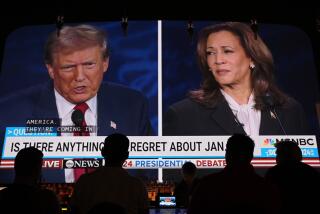FEC rules that candidates can’t solicit unlimited funds for ‘super PACs’
- Share via
A certain comedian’s visit to the Federal Election Commission brought crowds and television cameras to the agency, but campaign finance experts say a more important decision by the FEC on Thursday had no mention of the name Stephen Colbert.
The commission voted unanimously that federal officeholders and candidates cannot raise unlimited money for independent expenditure-only committees, more commonly known as “super PACs.”
That was the declared approach of the Republican Super PAC, a committee formed by Indiana attorney James Bopp, a strenuous opponent of campaign finance restrictions. Bopp’s PAC, created in May, planned to invite elected officials and candidates to raise unlimited money for the group, with the understanding those funds could then be earmarked to campaigns on behalf of those who solicited the funds.
Some campaign finance experts said the plan violated the 2002 McCain-Feingold campaign finance law, which says candidates and officeholders cannot raise unrestricted funds. But Bopp did not seek an advisory opinion from the FEC, telling the Los Angeles Times the tactic was “perfectly legal.”
Two Democratic-leaning super PACS—Majority PAC and House Majority PAC—then filed petitions with the FEC, with the intention of taking a similar approach to Bopp if the commission deemed it legal.
In its opinion Thursday, approved by a 6-0 vote, the FEC said candidates, elected officials and national party committees can only solicit an individual maximum of $5,000 for a super PAC, the same limit an individual can make to any single political action committee. They cannot solicit money from corporations or labor unions.
“This was more significant than the Colbert decision,” said Rick Hasen, a professor of election law at UC Irvine.
Fred Wertheimer, president of the campaign finance reform group Democracy 21, celebrated the decision.
“If a member of Congress or a president can ask for a million-dollar contribution to go to a PAC that’s going to spend it to help elect a president, that is bound to cause corruption,” Wertheimer said. “We praise the commission today for doing the right thing on a question of enormous potential consequence.”
As for Republican Super PAC’s plans, Bopp is undeterred. He pronounced the ruling as “exactly what we wanted.”
“There’s approval for candidates and political party officials to solicit for super PACs,” Bopp said. “They are going to praise and endorse the super PAC they are soliciting for. “
Bopp said any promotion of the PAC by a candidate or officeholder would have a disclaimer that the request was only for up to $5,000 for individuals.
“But donors are free to contribute all they want,” he said. “This disclaimer is completely meaningless.”
More to Read
Get the L.A. Times Politics newsletter
Deeply reported insights into legislation, politics and policy from Sacramento, Washington and beyond. In your inbox twice per week.
You may occasionally receive promotional content from the Los Angeles Times.








